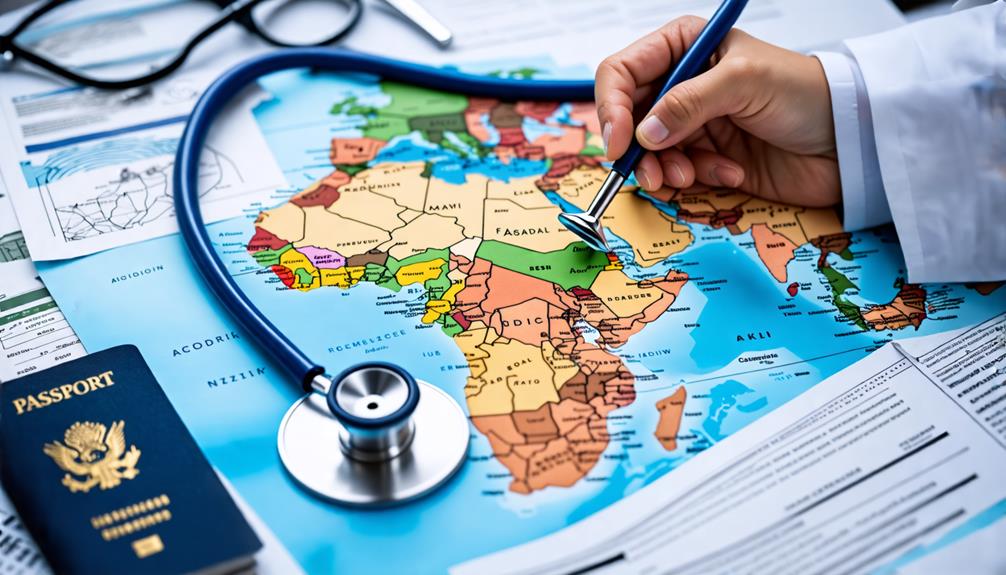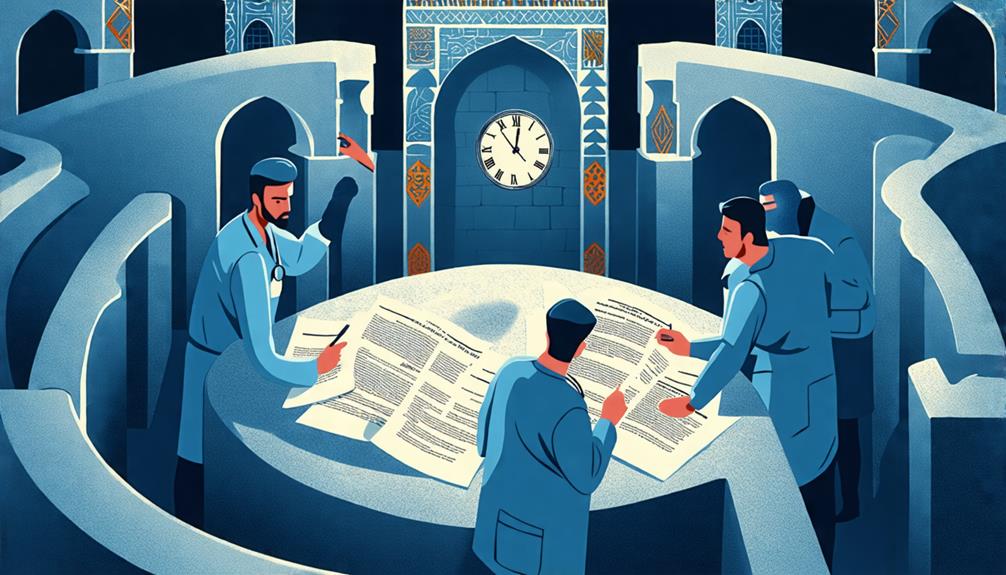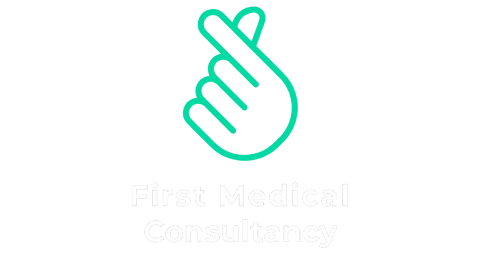Did you know that the healthcare industry in the Middle East is projected to grow by 11.7% annually until 2024? It’s an exciting time for medical professionals in the region!
As someone who’s navigated the complex world of medical licensing in the Middle East, I can tell you it’s quite the adventure. Each country has its own unique set of hoops to jump through, from the UAE’s notorious DataFlow verification to Saudi Arabia’s nerve-wracking Prometric exams.
But don’t let that scare you off! With the right information and a bit of perseverance, you can unlock incredible opportunities in this dynamic part of the world.
In this ultimate guide, we’ll dive into the nitty-gritty of medical licensing across the Middle East, revealing insider tips and strategies to help you succeed.
Ready to embark on this thrilling journey? Let’s get started!
Overview of the Medical Licensing Landscape in the Middle East

The medical licensing landscape in the Middle East plays a crucial role in ensuring the quality and safety of healthcare services. Proper credentialing for healthcare practitioners is essential, as it guarantees that professionals meet the high standards required to practice effectively in the region.
Each country maintains its own regulatory authorities and processes, necessitating careful navigation by practitioners seeking employment.
The UAE’s DataFlow verification process stands out as a mandatory step for employment, typically taking 15-60 days, with complex cases extending up to 90 days. Healthcare professionals should also recognize the importance of cultural adaptability and language proficiency in enhancing their employment prospects.
Key regulatory bodies in major Middle Eastern countries include:
- UAE: Dubai Health Authority (DHA) and Department of Health Abu Dhabi (DOH)
- Saudi Arabia: Saudi Commission for Health Specialties (SCFHS)
- Qatar: Qatar Council for Healthcare Practitioners (QCHP)
Medical licensing processes vary significantly among these countries, with differences in medical degree recognition, exam requirements, and overall duration. The UAE, for instance, maintains separate licensing processes for Dubai and Abu Dhabi, while Saudi Arabia operates a unified system through the SCFHS.
Qatar’s medical licensing process, overseen by the QCHP, involves credential evaluation and licensing exams.
Understanding these nuances is vital for healthcare professionals aiming to practice in the Middle East. By familiarizing themselves with the specific requirements of each country, practitioners can navigate the licensing landscape more effectively and increase their chances of successful employment in the region.
Eligibility Requirements for Medical Licensing

Whew, let me tell you, getting a medical license in the Middle East is no walk in the park! I’ve been through the wringer with this process, and I’ve got some hard-earned wisdom to share with you folks.
Detailed list of qualifications needed (medical degree, internships, residencies)
First things first, you’re gonna need that shiny medical degree. But don’t think you’re done once you’ve got that diploma in hand. Oh no, my friends. That’s just the beginning of your journey. I remember when I first started looking into this, I thought, “Hey, I’ve got my degree. How hard can it be?” Boy, was I in for a rude awakening!
Internships and residencies are the name of the game here. They’re not just a nice-to-have; they’re absolutely crucial for your UAE medical license application. I learned this the hard way when I tried to skip a step and got my application bounced back faster than a bad check. Trust me, you don’t wanna make that mistake.
Now, let’s talk about the medical qualifications verification process. It’s intense, y’all. I mean, they go through your credentials with a fine-tooth comb. I spent weeks digging through old boxes in my parents’ attic, trying to find every single certificate and transcript I’d ever received.
Pro tip: Keep all your important docs in one place. Future you’ll thank you.
Oh, and don’t even get me started on the DataFlow verification process. It’s mandatory for UAE employment, and it can take up to 90 days in complex cases. I swear, waiting for that to come through felt like watching paint dry in slow motion. But hang in there, it’s worth it in the end.
Language proficiency requirements (e.g., English, Arabic)
Language skills are a big deal in healthcare, as you’d expect. You’ll need to prove you’re fluent in English, and in some places, Arabic too. I thought my English was pretty good until I’d to take the proficiency test. Let’s just say I spent a lot of late nights with language apps after that wake-up call.
Required documents, including proof of education and experience.
The registration process for doctors is like putting together a jigsaw puzzle with your eyes closed. You’ve gotta submit a ton of documents – proof of education, work experience verification, letters from old bosses saying you’re not a complete disaster. It’s a lot, but stay organized and you’ll get through it.
For us foreign medical grads, there’s often an extra hoop to jump through: equivalency exams. I remember sweating bullets during mine, convinced I’d forgotten everything I’d ever learned in med school. Spoiler alert: I hadn’t, but man, those exams are no joke.
Oh, and don’t forget about the clean criminal record and proving you’re fit to practice. They take this stuff seriously, which is good for patients but can be nerve-wracking for us docs. I’d a minor traffic violation from years ago that I was sure would torpedo my chances. Turns out it wasn’t a big deal, but I lost sleep over it for weeks.
The whole process can be frustrating, I’m not gonna lie. There were times when I wanted to throw in the towel and go become a goat herder or something. But let me tell you, the feeling when you finally get that license in your hands? It’s like winning the medical Olympics.
Country-Specific Licensing Procedures

I’ll now guide you through the medical licensing processes in key Middle Eastern countries.
We’ll examine the specific procedures for obtaining a medical license in the UAE, Saudi Arabia, Qatar, Oman, and Kuwait.
Understanding these country-specific requirements is essential for healthcare professionals looking to practice in the region.
Each country has unique regulations and standards that must be met for successful licensure.
Ensuring that your qualifications and certifications are recognized by the respective health authorities is a significant step in this process.
UAE Medical Licensing Process
The UAE’s medical licensing process presents a unique challenge for healthcare professionals seeking to practice in this Gulf nation. While complex, it’s certainly manageable with the right approach.
Three main licensing authorities govern the process: Dubai Health Authority (DHA), Health Authority Abu Dhabi (HAAD), and Ministry of Health (MOH). Each has its own pathway, but they share common steps in the medical credentialing process.
To navigate the UAE medical licensing process effectively:
- Verify your qualifications and experience thoroughly
- Pass the relevant medical licensing exam for the Middle East
- Complete professional registration for healthcare in your chosen emirate
The UAE’s healthcare system demands strict compliance with health regulations. Prepare extensive documentation, including educational certificates, work experience letters, and good standing certificates.
Online resources for medical licensing can be invaluable during this process. Be aware that each authority may have slightly different requirements, so research thoroughly and prepare accordingly.
Effective use of professional networking platforms can be a valuable tool for healthcare professionals aiming to establish their careers in the Middle East. These platforms offer insights and networking opportunities that can aid in the licensing journey.
With persistence, attention to detail, and proper preparation, you’ll successfully navigate the UAE’s medical licensing landscape.
Saudi Arabia Medical Licensing Process
Saudi Arabia’s medical licensing process presents a unique set of requirements and challenges for healthcare professionals seeking to practice in the country. The Saudi Commission for Health Specialties (SCFHS) oversees the licensing process and plays a crucial role in healthcare workforce development.
To obtain a medical license in Saudi Arabia, you must fulfill specific medical residency requirements and successfully pass a licensing exam. Given the robust growth projections for the Middle Eastern healthcare sector, it’s imperative to align your education with Saudi standards.
Pursuing healthcare education programs that conform to these standards will significantly enhance your chances of success. Professional healthcare associations offer valuable resources and guidance throughout the licensing process.
A key strategy for success in the medical licensing exam is to thoroughly familiarize yourself with Saudi healthcare regulations and practices. Many candidates who’ve successfully obtained their licenses attribute their achievement to investing time in understanding the local medical landscape.
Qatar Medical Licensing Process
Healthcare professionals seeking to practice in Qatar must navigate the licensing process overseen by the Qatar Council for Healthcare Practitioners (QCHP). This rigorous process ensures all practitioners meet high standards, mirroring other health professions councils in the Middle East.
With the expanding demand for specialized medical care in the region, Qatar presents abundant opportunities for qualified professionals.
Key aspects of the licensing process include:
- Document verification, encompassing qualifications and work experience
- Successfully passing the QCHP licensing exam specific to your specialty
- Fulfilling continuing professional development requirements
While nurses and other healthcare professionals follow similar pathways, specific requirements may differ.
Potential challenges in the licensing process can include language barriers or differences in medical education systems. Awareness of these hurdles is crucial for a smooth application process.
Qatar’s commitment to developing its healthcare sector translates into excellent job opportunities for skilled professionals.
Oman and Kuwait Medical Licensing Processes
The licensing landscapes in Oman and Kuwait share similarities with Qatar’s process, but each country maintains its unique requirements. Medical professionals considering a career in the Middle East must understand these processes thoroughly.
In Oman, healthcare registration begins with submitting qualifications to the Ministry of Health. Proof of education, experience, and a valid license from your home country are essential. Oman’s healthcare law and ethics require passing a written exam and an interview in English or Arabic.
Understanding employment trends in the region will help align your career goals effectively.
Kuwait’s medical licensing process is equally rigorous. The process starts with an application through the Kuwait Medical Association. They verify credentials and require passing a licensing exam. Kuwait mandates a minimum of two years’ experience for most specialties.
Both countries offer promising job prospects in Middle East healthcare for expatriates. Working with reputable medical recruitment agencies specializing in the Middle East is advisable. These agencies can guide you through complex licensing procedures and help navigate cultural subtleties effectively.
The Medical Licensing Exam

Obtaining a medical license in the Middle East requires passing a comprehensive licensing exam. The exam typically includes written and practical components, assessing your medical knowledge and clinical skills. Success demands a focus on region-specific medical practices and cultural considerations in healthcare delivery.
Key exam components and preparation strategies:
| Exam Component | Preparation Tips |
|---|---|
| Written MCQs | Review local guidelines |
| Clinical Cases | Practice with peers |
| OSCE Stations | Simulate patient interactions |
| Ethics | Study regional medical ethics |
| Language | Improve medical Arabic/English |
Overcome common challenges by:
- Joining study groups with local professionals
- Attending CPD courses to meet CPD requirements Middle East
- Networking for healthcare professionals to gain insights
Cultural awareness is crucial. Familiarize yourself with local customs and medical practices. Language proficiency is essential – many exams require fluency in both English and Arabic.
Stay current on the latest medical advancements and regional health priorities. Thorough preparation and cultural sensitivity will equip you to excel in the medical licensing exam in the Middle East.
Challenges and Solutions in the Licensing Process

Let me tell you, navigating the medical licensing process in the Middle East is no walk in the park. I’ve been through it myself, and boy, was it a roller coaster ride! When I first decided to pursue my medical career in this region, I’d no idea what I was getting myself into.
Common hurdles applicants encounter during the licensing process
The first hurdle I hit was the mountain of paperwork. I swear, I felt like I was drowning in forms and certificates. One time, I spent hours filling out a stack of documents, only to realize I’d used the wrong color ink. Rookie mistake!
Pro tip: always use blue or black ink, and make multiple copies of everything. Trust me, you’ll thank me later.
Solutions and tips for navigating paperwork, exam preparation, and language barriers
Then came the language barrier. I thought my basic Arabic would be enough, but boy, was I wrong. Medical terminology in Arabic is a whole different ballgame. I remember sitting in an office, trying to explain my qualifications, and accidentally saying I specialized in “camel medicine” instead of “family medicine.”
The look on the official’s face was priceless! After that embarrassing incident, I buckled down and enrolled in an intensive Arabic course. It was tough, but it made a world of difference.
One thing that really threw me for a loop was the varying standards across different countries in the region. I initially applied in the UAE, thinking my credentials would be accepted everywhere.
Nope! Each country has its own quirks and requirements. I learned the hard way that it’s crucial to research the specific requirements for each country you’re interested in. Don’t assume anything!
Now, let me share some tips that saved my bacon during this process:
- Organization is key. I created a massive spreadsheet to track all my documents, their expiration dates, and where I’d submitted them. It was a lifesaver when I’d to quickly find that one obscure certificate I’d forgotten about.
- Build a support network. I joined online forums and WhatsApp groups for foreign doctors in the Middle East. The advice and moral support I got from people who’d been through the process was invaluable.
- Be patient and persistent. There were times when I wanted to throw in the towel, especially when faced with seemingly endless bureaucracy. But remember, good things come to those who wait (and fill out countless forms).
- Don’t be afraid to ask for help. I initially tried to do everything myself, but eventually swallowed my pride and hired a local consultant. Their insider knowledge saved me weeks of headaches.
- Keep your documents updated. I learned this the hard way when my police clearance expired right before the final submission. Always check expiration dates and renew documents well in advance.
Looking back, the licensing process was one of the most challenging experiences of my life. But you know what? It was also incredibly rewarding. The sense of accomplishment when I finally received my license was unbeatable. Plus, the skills I gained – patience, persistence, and the ability to navigate complex systems – have served me well in my medical career.
Conclusion
Throughout this guide, we’ve navigated the intricate landscape of medical licensing in the Middle East. From the UAE’s bustling healthcare sector to the unique requirements of each country, you’re now equipped with essential knowledge to embark on this journey. Remember, cultural sensitivity and thorough preparation are your allies in this process.
As you contemplate your next steps, consider partnering with First Medical Consultancy. With over a decade of experience, we’re passionate about connecting healthcare professionals like you with exceptional opportunities across the region.
Our friendly, knowledgeable team is ready to support you, turning your career aspirations into reality. Thank you for investing your time in this guide.
We’re excited to see you thrive in the dynamic world of Middle Eastern healthcare. Your adventure awaits – let’s make it happen together!
Common Questions
How Long Does It Typically Take to Complete the Licensing Process?
Picture a winding road versus a straight path. I’ll tell you, the licensing process can take anywhere from 6 months to 2 years. It’s not quick, but it’s thorough. You’ll need patience and perseverance.
Are There Opportunities for License Reciprocity Between Middle Eastern Countries?
Yes, I’ve found that some Middle Eastern countries offer reciprocity agreements. However, it’s not universal. You’ll need to check each country’s specific requirements. I’d recommend contacting local medical boards for the most up-to-date information on reciprocity options.
What Are the Language Requirements for Medical Practice in Different Countries?
In my experience, language requirements vary widely. You’ll need Arabic in most countries, but English is often accepted too. I’ve found that Gulf states may require both. It’s best to check each country’s specific regulations before applying.
How Often Do Licensed Doctors Need to Renew Their Credentials?
Time flies when you’re saving lives! In my experience, credential renewal varies widely. I’ve seen it range from annually to every five years. It’s essential to stay on top of your specific country’s requirements to maintain your license.
Are There Fast-Track Licensing Options for Experienced International Physicians?
I’m aware that some Middle Eastern countries offer fast-track licensing for experienced international physicians. It’s not universal, though. I’d recommend checking with specific medical authorities, as requirements can vary greatly between nations in the region.
